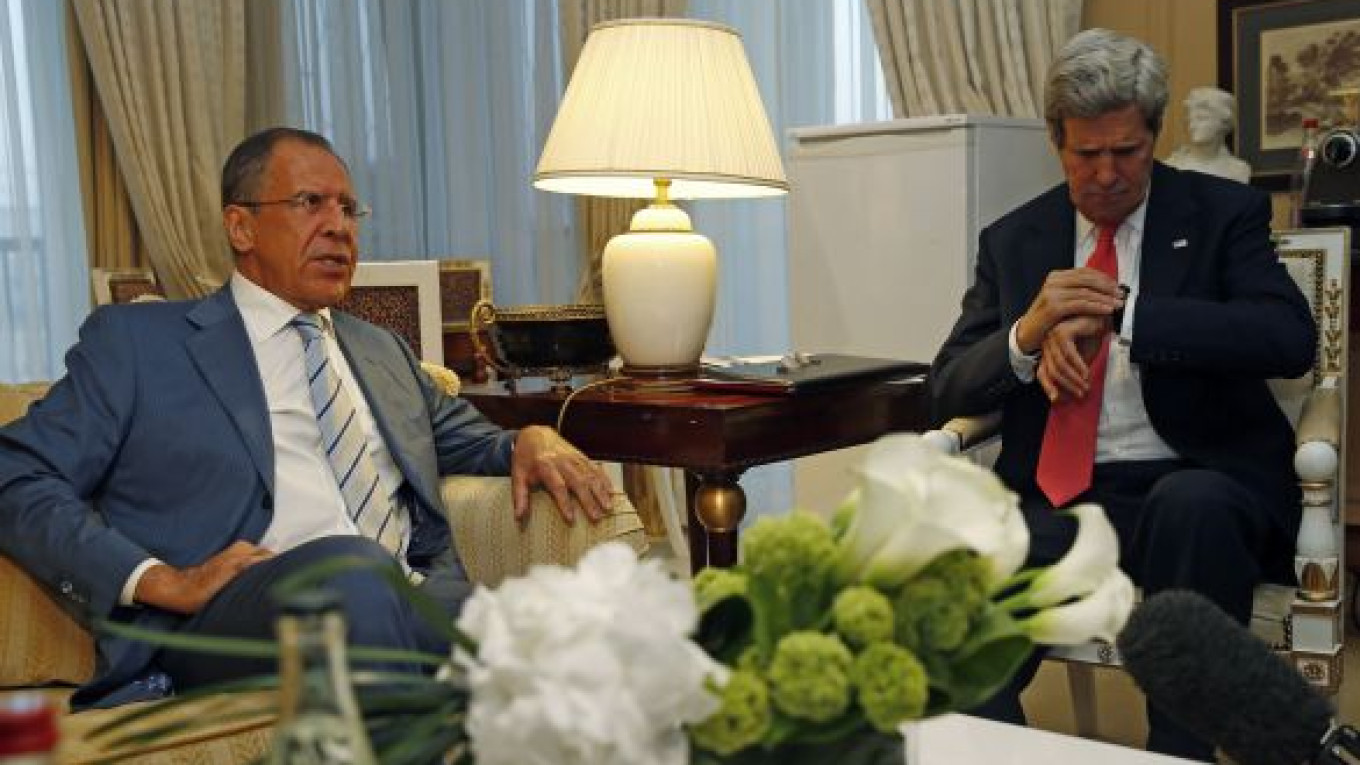PARIS — Holding a conference to end Syria's civil war will be a "tall order," Foreign Minister Sergei Lavrov said after talks with his U.S. counterpart, but he saw some chance of success.
Lavrov and U.S. Secretary of State John Kerry said late Monday that they would do their utmost to bring Syria's warring parties to the table as fighting intensified and new allegations of chemical weapons use surfaced.
The proposed conference — expected to be held in mid-June in Geneva — reflects the first serious diplomatic effort in nearly a year to end the conflict in which more than 80,000 people are believed to have died and millions have fled their homes.
While emphasizing the challenges of getting the conference, proposed by Kerry and Lavrov earlier this month, off the ground, Lavrov was not entirely downcast.
After talks with U.S. Secretary of State John Kerry, Russia’s foreign minister expresses confidence in the conference’s success.
"It's not an easy task. It's a very tall order. But I hope that when the United States and the Russian Federation take this kind of initiative, the chances for success are there," he said after the two met by themselves for roughly 90 minutes.
Sitting side by side in a Paris hotel, Kerry told reporters that he and Lavrov had discussed the timing and the participants for the conference and they had voiced worry about the possible use of chemical weapons.
"Both of us expressed our mutual concerns about any potential use of chemical weapons and the need to really get the evidence and ascertain what has happened in that regard," Kerry said. "Both Russia, and the United States — if it were being used — object to that very, very strongly."
Heavy fighting raged on Monday around the strategic Syrian border town of Qusair and the capital, Damascus, and there were further reports of chemical weapons attacks by Syrian President Bashar Assad's forces.
Syrian government offensives in recent weeks are widely seen as an attempt to bolster Assad's negotiating position before the planned conference.
Both sides in the conflict, now in its third year, have accused each other of using chemical weapons.
Syria's government has said it will attend the conference, but the Syrian opposition is still struggling to reach unity in their fractious ranks and has not yet committed to attend.
One point of disagreement between the U.S. and Russia is whether Iran should attend any meeting, with Moscow arguing that it should and Washington making clear it has little interest in this, although not absolutely ruling it out.
"We believe that this circle could be expanded to involve all key outside players who have influence on the situation on the ground," Lavrov said in an allusion to Iran, although he did not cite it by name.
Iran is believed to be one of the main arms suppliers to the Syrian government and it also has significant influence over Lebanese Hezbollah, which has become an increasingly active player on the ground by fighting with government forces.
After the meeting, Kerry and Lavrov dined with French Foreign Minister Laurent Fabius, whose nation, along with Britain, has been pushing to end an EU arms embargo that has preventing them from giving weapons to the rebels.
Related articles:
A Message from The Moscow Times:
Dear readers,
We are facing unprecedented challenges. Russia's Prosecutor General's Office has designated The Moscow Times as an "undesirable" organization, criminalizing our work and putting our staff at risk of prosecution. This follows our earlier unjust labeling as a "foreign agent."
These actions are direct attempts to silence independent journalism in Russia. The authorities claim our work "discredits the decisions of the Russian leadership." We see things differently: we strive to provide accurate, unbiased reporting on Russia.
We, the journalists of The Moscow Times, refuse to be silenced. But to continue our work, we need your help.
Your support, no matter how small, makes a world of difference. If you can, please support us monthly starting from just $2. It's quick to set up, and every contribution makes a significant impact.
By supporting The Moscow Times, you're defending open, independent journalism in the face of repression. Thank you for standing with us.
Remind me later.


